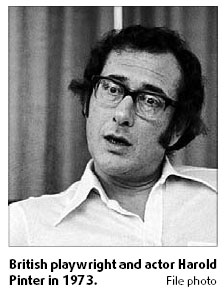Nobel Prize-winning British playwright Harold Pinter, who died on Christmas Eve aged 78, was undoubtedly a literary giant but debate about his legacy is already being waged in China.

Xu Ang, 30, a director with the prestigious People's Art Theatre, first read Pinter's The Lover when he was studying directing at the Beijing-based Central Drama Academy.
"I did not quite understand it at first," he says. "The characters kept talking in boring everyday prattle. It seemed weird to me then."
But the confusion drove Xu to challenge himself to read the play again and again. In 2004, he directed The Lover and the play was presented in the People's Art Theatre.
"Pinter can tell the most complicated story in the simplest English," Xu says. "I love his work because of its subtlety and the pleasure of brooding his works bring about."
Xu has staged five productions of the play so far, the latest version ending yesterday. He says it is now better accepted by audiences than ever before.
"Good authors like Pinter see their audience as a group of smart people," he says. "For Pinter's plays, the last part is fulfilled by the audience. Every person completes the story in his or her own brain."
He Chengzhou, professor of Nanjing University's English department, says Pinter has had a great influence on modern Chinese theater.
"Before the 1980s, Chinese theater focused on telling a complete story," he says. "But through Pinter's works, dramatists found a new possibility to relegate the plot and attract audience by a unique style of language, something we call Pinteresque."
He also thinks the menace and disquiet that characterized Pinter's best-known plays resonated with the literary trend in China in the early 1980s, following a destructive "cultural revolution" (1966-76).
He appreciates Pinter as a playwright with a strong social concern, illustrated in signature works such as The Caretaker and his fight against repression and censorship, at home and abroad.
"Put The Caretaker in the social context of the 1950s, when British people held an ambivalent attitude toward immigrants from South Asian and North African countries, and you will find it isn't only a story about a tramp," he says.
Pinter's fame soared in China after he won the Nobel Prize in 2005.
"Undoubtedly Pinter is among the foreign dramatists whose works are the most adapted and presented in China," says Professor Shen Lin, of the Central Drama Academy.
But Shen holds a conservative attitude toward Pinter's influence on Chinese theater.
"The impact is not as apparent as that of Bertolt Brecht, Henrik Johan Ibsen or even Samuel Beckett," he says.
"The reason may lie in the fact that most translated works have not conveyed the essence of his language."
(China Daily December 29, 2008)